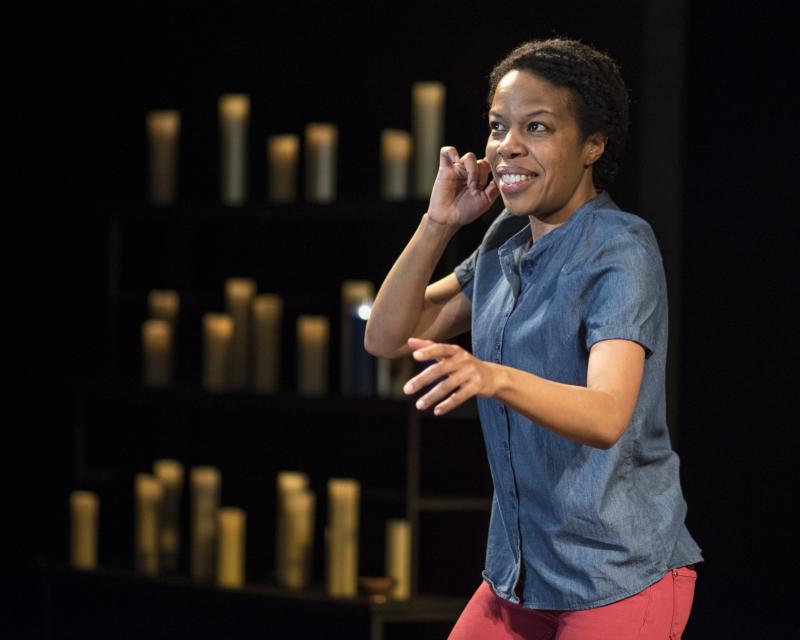Review: It takes Nilaja Sun to Build a Breathtaking Village on PIKE ST. at Berkeley Repertory Theatre

Human beings are inherently social creatures. We tend to revel in the shared experience. It is one of the major elements that make the live theatre experience so distinct from binging the latest streaming series. Actors - usually humans! - are also social creatures. They engage in dialogue and rely on each other to tell a common story. For the solo performer, however, there's no one to help carry the load. "You're on your own, kid!"
In Pike St., now at Berkeley Repertory Theatre, playwright and actor Nilaja Sun meets that challenge and raises those stakes exponentially, single-handedly presenting a stage full of dynamic, three-dimensional characters engaging with each other in rapid-fire conversation and scenes of vigorous interaction.
Sun opens the play with a cleansing exercise that seeks to literally sweep the slate clean to begin her slice of life on Pike Street, "under the Manhattan Bridge." There we meet Evelyn, a focused and protective mother in a tenement apartment on the Lower East Side, struggling to navigate the social services system and also establish her newly chosen career as a professional healer. Her daughter Candi is a teenager in the aftermath of a brain incident that left her unable to speak, eat, or breathe on her own. Still, Evelyn treats Candi as normally as possible. She shares information and observations in an upbeat, conversational way, eschewing the diminunizing patois that people speak to small dogs, babies, and the very elderly. Evelyn is a focused caregiver, and part of that involves respecting her daughter and also asking around her apply the best practices that Evelyn has painstakingly assembled.
That's quite an ask for the gallery of Puerto Rican family members and outsized neighborhood characters Sun has written into her play. There's Evelyn's randy, irascible father, Papi, who asserts his vitality through liquor, swearing, and "nooky time" with Migdalia, his dim-witted, manipulative girlfriend. Manny is the "prodigal" son and brother, returned from military service to his family and to his Korean street bestie, Taquin, whose desperate attempts at "playa" moves are comic gold. They and other inhabitants of this community in the 'hood, like their racially obtuse neighbor Mrs. Appelbaum (a hoot), cluster in twos and threes, arguing and cajoling, deflecting, dreaming, and demanding.
The script is vibrant, careening from thoughtful, introspective ruminations to wry, socially inappropriate humor and political assessments. The characters are richly drawn, and Sun is not afraid to have them both resist the racism imposed on them and then impose their racism on others. "It's not really racist when they're not around to hear it," jokes Papi after a cultural judgment about burqas. All of the characters speak their respective truths, convenient or not, without reservation and a dizzying array of topical subjects are visited including climate change, the futility of war, the value of faith, gender dynamics, xenophobia, economic struggles, and the opportunity divide.
Family, blood or chosen, is the center of life for these people and there are secrets - there are always secrets in a family drama - that can divide them and challenges that may defeat them. Evelyn is convinced that Candi will recover and dedicates her life to that goal. Taquin dotes on his daughter even as his wife makes his life miserable. After losing so much else in life, Papi dreads losing the respect of his son over the truth about the family business, and Manny must confront the reality about his recent experiences.
For eighty minutes, Sun pivots both vocally and physically from the highly articulate, lightly-accented Evelyn to the Yiddishisms of Mrs. Appelbaum to Migdalia's Rosie Perez-flavored malaproprisms with crispness and lightning dexterity. It is a dazzling display of control and craft. Having her present any one of these characters could be deemed a satisfying theatre experience. That she inhabits them all, and so fully as to allow us to - if not empathize with them - at least see their flawed humanity are real, is an astonishing feat.
It's a spare physical production, the better to not distract from Sun's work, with just enough suggestion of spaces and places by Mikiko Suzuki MacAdams (scenic design), Tyler Micoleau (lighting design), and Clint Ramos (costume design). Special credit goes to sound designer Ron Russell for channeling inane everyday audio like the theme to The Price is Right into Candi's aural plane and sharing that with us.
The end of the play is startling and, no spoilers here, feels disconnected from what has come before even though Sun has been steadily leading to it. Whether or not you agree with that reservation, you will be hard pressed to find a more intriguing and literally multidimensional performance on Bay Area stages at the moment.
Pike St. runs through December 9 at Berkeley Repertory Theatre.
TICKETS | Image: Teresa Castracane
Reader Reviews

Videos

